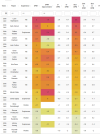I'm a big fan of advanced stats. I get that it's constantly a work in progress, but I like the idea of anything that tries to objectively measure a player's impact. I like Raptor and I'm partial to BPM as far as the one-stat-to-rule-them-all ones go.
I'm glad that we're at a point where advanced stats are supplanting your basic boxscore ones, but I'm even more excited about them putting the "eye-test" in the garbage bin of history. The sheer idea that a human can keep track of all the information and everything that happens on the court in real time is laughable. Some of it is that there are 10 bodies in constant insanely quick motion out there, some of it is recency bias, some of it is that our brain simply can't process some of this information in a useful way. I watched the game last night and if you asked me who had the most assists on the team, I'd probably say Kelly. Not necessarily because I remember counting the assists but because of a couple of elite passes he made for easy buckets. Someone may well have had more assists on account of more simple, less-memorable passes.
That's just assists, it's pretty simple stuff. When Rudy was here and at his peak, much was made of both the opponent shooting percentage at the rim when he's defending them and how many open shots(and made baskets) his screens led to. These were just a few advanced stats that explained why we had such a good defense and eventually offense, but also why he was a top 10 player in the league. There is no way that I, or anyone else, would be able to gauge any of this just by watching the game. It's just too much information. Yeah, I knew that it was a bad idea for small guards to challenge Rudy at the rim, but I couldn't quantify it. How much of a drop off was it when Favors was in for Rudy? How does Rudy compare to other players in the league? How much of an impact does it all have on our defense? How in the world would I know? Single-game eyeball test is hard, let alone bigger, season-long trends.


